CHAPTER 9
Measuring SEO Results
CHAPTER SECTIONS
Once you have crafted an effective SEO strategy for your vacation rental business, it’s time to track your SEO efforts and understand what works for your business.
To improve your SEO strategy, you might want to know how many visitors are searching for your vacation rentals or how many visits turn into bookings.
In this chapter, we will discuss how you can measure your vacation rental business’ SEO success. It covers:
- Why it’s crucial to measure SEO success
- How long does SEO take?
- Top tools to measure SEO
- Essential SEO metrics you need to track
- Other goals to track
- Checking for analytics issues
The Importance Of Measuring Your SEO Success
When you optimize your vacation rental business to rank high on search engines and increase its online exposure, be sure that you are implementing the right SEO tactics. Track your SEO efforts and measure them to ensure that your strategies align with your business objectives. This also gives you the leeway to make necessary improvements based on the resulting data.
The following are some reasons why you need to measure your property business’s SEO success:
- SEO is an intensive process that requires a lot of research, hard work, and investment which is why it’s important to keep a close track of your SEO results to make sure that this work is paying off
- SEO has the power of turning your vacation rental business around, but if you don’t have certain KPIs or benchmarks set to measure your SEO efforts progress, it all goes in vain
- It is difficult to assign an exact monetary value to your SEO efforts, but you can calculate the return on investment (ROI) of your SEO campaigns
How Long Does SEO Take?
Any time you start discussing the measurement of an SEO campaign, the inevitable question about “how long SEO takes?” will come up. It’s understandable. SEO is a complicated process and requires a lot of changes from several stakeholders.
It’s realistic to start seeing SEO results in about 4 to 6 months but it can take longer. Remember, SEO isn’t a sprint, it’s a marathon. And that marathon can provide consistent results for a very long time if you have the right approach to your SEO efforts.
Also, every website is different and will require a different strategy to move the needle.
This of course, depends on the starting point of your website.
- Is your vacation rental website new?
- Have you recently gone through a website migration?
- Does your website have a high domain authority?
- Is it located in a very competitive vacation rental market?
- What are your property management competitors doing?
- How much local content do you have?
- Do you create content on a regular basis?
- Has your site ever been penalized for poor SEO tactics?
- How bad is the technical SEO on your website?
- How flexible is your vacation rental CMS?
All of these variables will factor into how quickly you’re able to see positive results from your SEO campaign.
Why Does SEO Take So Long To See Results?
SEO is a zero-sum game. If your site improves in the search results, that means another site has to move down.
At a high level, in order to rank #1, another site has to rank #2, a competitor has to rank #3, and so on.
If your site hasn’t created the necessary authority to compete with top competitors, then it will take your site longer to see any noticeable increases in traffic.
This is why it’s so important to strategically pick your SEO competitors and execute a plan that will get results for your property management business.
You can level the playing field by understanding this, reducing the number of companies you’re competing with, and targeting gaps in your primary competitor’s strategies.
Then there’s the process of your vacation rental SEO agency and how it relates to your engagement. These tasks and processes take time. The larger your budget is the faster these can be accomplished but that will vary from agency to agency.
- Research
- Market research
- Keyword research
- Audits
- Competitor analysis
- SEO audits
- Optimization
- Site crawls
- Writing the optimization
- Implementing the optimization
- Content
- Planning
- Copywriting
- Content development
- Link Building
- Link building strategy creation
- Outreach
- Strategy
- Putting the strategy together
- Executing the strategy
- Implementation
- Working with 3rd party developers
- Making site changes yourself
- Client delays
All of these things contribute to the length of time it takes to see SEO results as well as how much money you’ve invested in your SEO strategy.
Do you have an internal team that can help create new content? Do they know the basics of creating SEO friendly content for your property management website?
If not, then your SEO agency will have to take that on and that could extend the time it takes to get things created.
Why Is There A Delay In Seeing Results From Search Engines?
There is a lot of content on the internet today and it’s Google’s job to discover and index everything.
New Websites Per Day
According to Siteefy.com, there’s approximately 380 new websites created every MINUTE. That’s 547,200 new websites per day. As you can expect, there’s a bit of a queue.
Spam Mitigation
There’s also the fact that Google has to deal with spammers and black hat SEOs constantly trying to game the search results.
They have to have some measures in place to prevent these sites from getting visibility that they don’t deserve.
For that reason, they can’t crawl, index, rank and display every new website right away. They need time to process those websites and their ranking signals before showing them in the search results.
There are times when legitimate sites can have their new pages shoot up to the top of the search results shortly after pushing “publish”.
In some cases, those are mini tests performed by Google to see if the page is a good match for the search query and if it is, it will keep it ranked highly until they have data that indicates it should have its ranking reduced.
Top Tools to Measure SEO Results
In order to track the progress of your SEO you’ll need to track metrics that matter for your business. Those are the metrics that can be easily tracked and attributed to progress. To do that you’ll need at least three tools:
- Google Analytics
- Google Search Console
- A Rank Tracking Tool
We’ll quickly cover those tools here and then you’ll find specific use cases within each metric below.
Google Analytics
Google Analytics is a free tool that offers valuable data and insights about your rental business’ website.
However, logging into Google Analytics can be quite overwhelming for any small business owner. There are a lot of reports, metrics, and graphs to understand if you aren’t familiar with analytics.
Explaining every detail about analytics is out of scope for this guide as there are several great resources on the web and YouTube for learning analytics.
Additional Resources
Google Search Console
This is where you’ll find important information on your SEO efforts and data for the number of times your site or property was visited, clicked in the search results, and its average position in the search engine rankings.
There’s also several technical tools within GSC that can be useful for troubleshooting site problems like crawl errors, indexation issues, sitemap submission, schema markup detection, and more.
Additional Resources
Here’s a great video tutorial on how to get started with Google Search Console.
Rank Tracking Tools
Rank tracking tools help you monitor your website’s SEO ranking for specific keywords. It even allows you to monitor your keyword rankings’ changes and compare their positions with your competitors.
This can be useful when trying to identify why there are traffic fluctuations.
Some of the best rank tracking tools include SEMrush, Ahrefs, Serpstat, Moz, and many more.
Many of these tools offer short term free trials to allow you to try them out before committing to a longer subscription.
PRO TIP
If you’re short on budget for getting an SEO tool, try out RankTank.
They offer free rank tracking using Google Sheets and some fancy scripts. It’s not perfect but it’s a great resource for free and they are constantly updating it with new improvements.
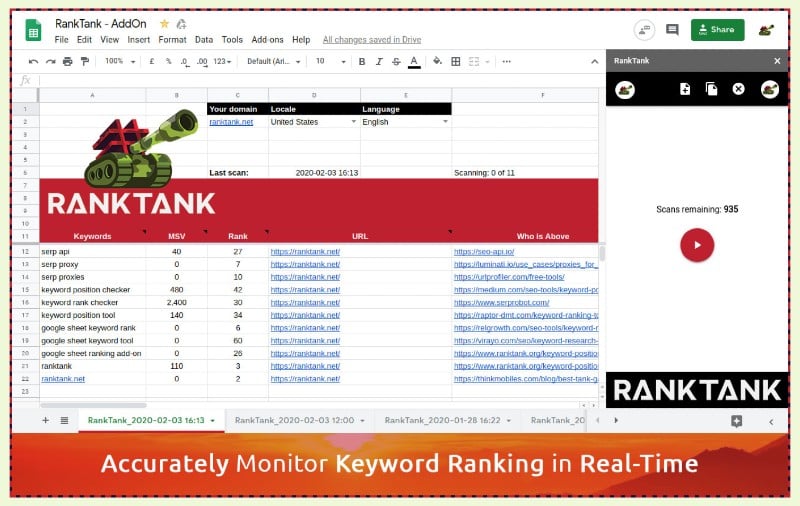
Google Data Studio (Looker Studio)
Relatively new to the analytics toolset is Google Data Studio. This tool isn’t required but can make your tracking and data analysis a little more streamlined.
Data Studio allows you to create beautiful dashboards and data visualizations to help with making better business decisions. Data studio also integrates with hundreds of other data sources as well as custom sources.
Google Connectors
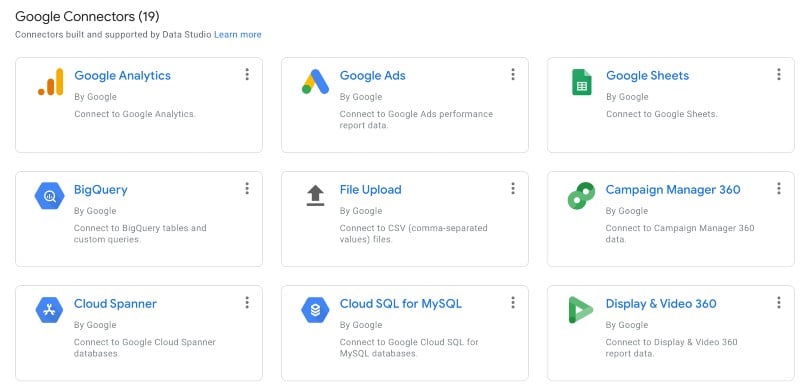
3rd Party and Partner Connectors
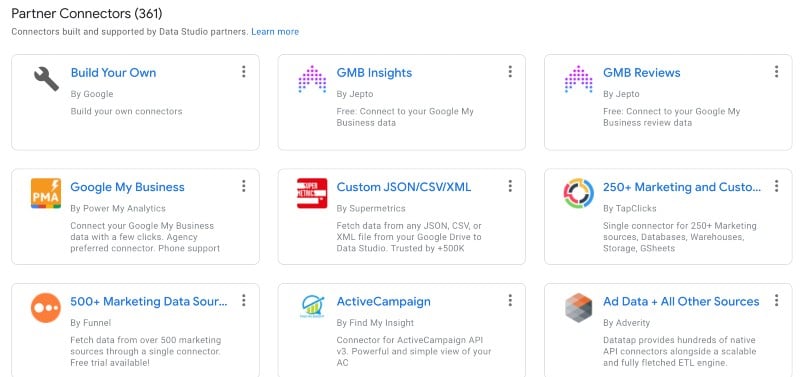
Rather than having to sift through tons of data from multiple sources you can pull only the data you care about into one, easy-to-use dashboard.
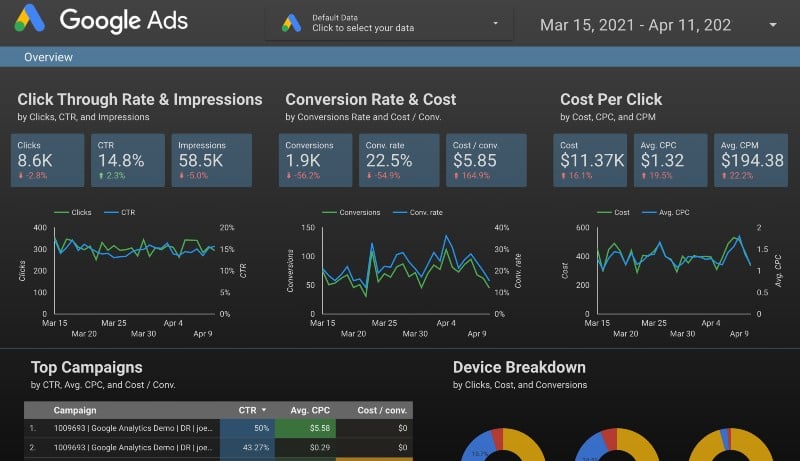
Essential SEO Metrics You Need To Track for Rental Sites
Here are the metrics we’ll discuss in this section of the guide. There’s a lot of metrics to measure but we want to focus on the metrics that can be easiest to build a case towards SEO having a positive impact on the business.
- Organic Traffic
- Mobile Organic Traffic
- Impressions & Clicks
- Keyword Rankings
- Organic Conversions (Bookings)
- Organic Revenue
Organic Traffic
The main purpose of SEO is to generate organic traffic for your vacation rental business. It refers to the visitors directed to your website through unpaid search engine results rather than paid ads.
Organic traffic should be your main metric for tracking your SEO efforts.
It’s nice to be able to include revenue, conversions, and user experience metrics like time on site, but at the end of the day SEO is meant to increase traffic.
It’s an acquisition tactic (get your brand in front of new guests) so you’ll know your SEO is working if your organic traffic trend looks like this:

However, you want to avoid generating a lot of low-value traffic in SEO.
That’s why we’ll also discuss other metrics worth tracking because a lot of low-value traffic that doesn’t convert isn’t worth spending your marketing dollars on.
Organic Traffic by Landing Pages
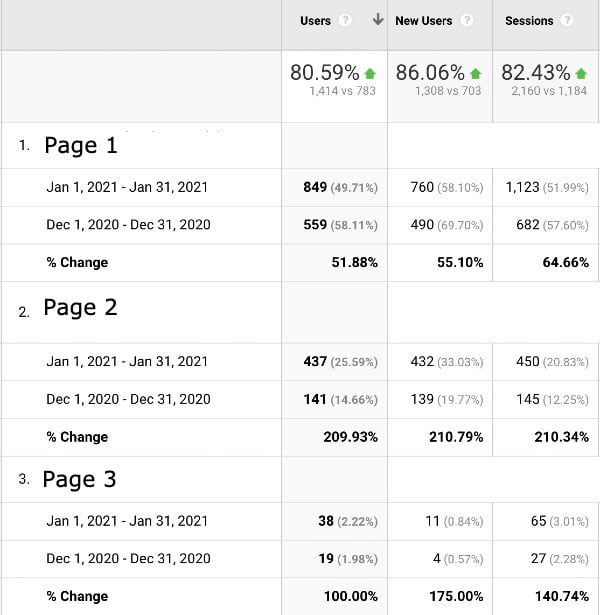
Mobile Organic Traffic
Due to the increase in mobile usage, the amount of visits coming to your vacation rental properties from mobile devices has steadily increased.
According to Google, 48% of mobile users are already planning their entire trips from their smartphones. And this stat is from 2017. This has likely increased since this data was published.
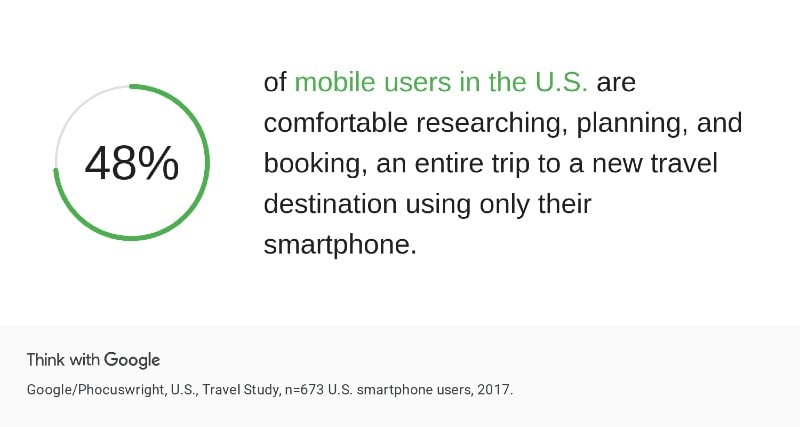
So you’ll want to keep an eye on how much organic traffic is coming to your site from mobile devices to ensure there aren’t any issues with your mobile experience.
Also, keep an eye on bounce rates, conversions, and session duration.
Organic Impressions
Impressions are how many people are viewing your site in the organic search results when they perform a search.
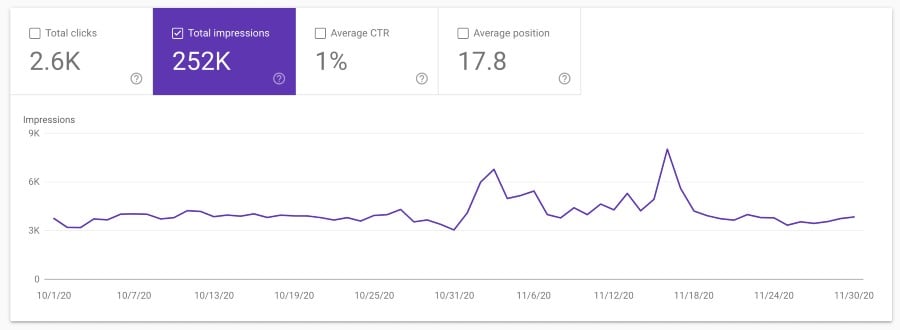
These impressions are an indicator of early SEO success.
Organic impressions are valuable as they can show an improvement in brand awareness (which could lead to direct bookings in subsequent searches) and they can indicate which no-click searches are generating “buzz” for your business.
Impressions shouldn’t be ignored just because they can’t be directly attributed to conversions and bookings.
You can see the progress being made on specific pages in an SEO campaign by going to your Performance module in Google Search Console.
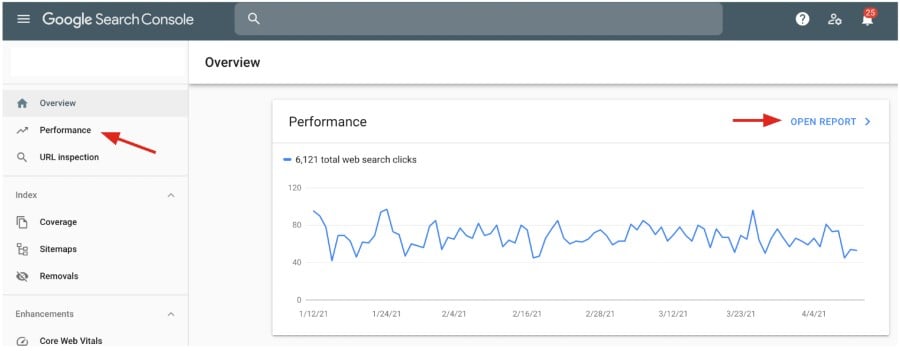
From there you can select a date range and filter for Pages, Queries, and more.
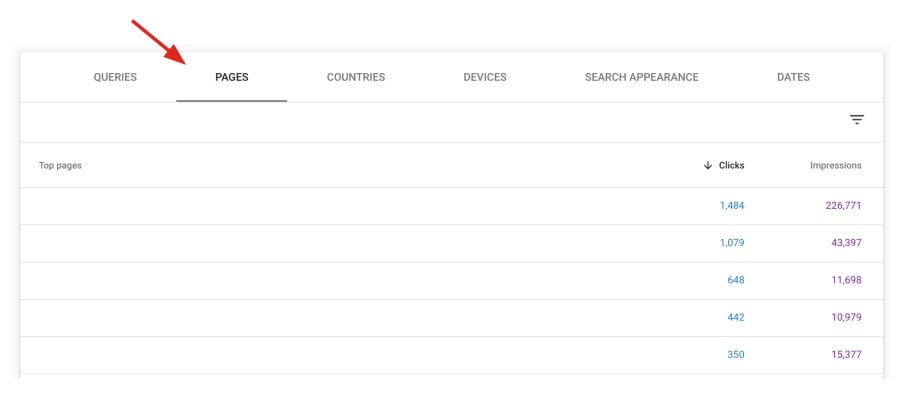
Keyword Rankings
In some cases, it can be useful to track keyword rankings to monitor the improvements that contribute to your SEO campaign’s success.
In addition to the paid tools mentioned earlier, you can use Google Search Console to monitor your vacation rental website’s performance on search engines. It offers pretty basic keyword rankings but they can be useful to show progress.
But sometimes, tracking keyword rankings as a metric is not a good decision. This includes:
- Tracking or obsessing over a ranking for a phrase that has a high search volume but does not increase your bookings
- Ranking high for a phrase that has a low search volume
- Ranking for a term or phrase that isn’t relevant to your business
When it comes to keyword rankings, it is important to note that rankings fluctuate and differ with different regions.
Even Google Search Console offers an average position that specifies where you rank in the search results for specific keywords.
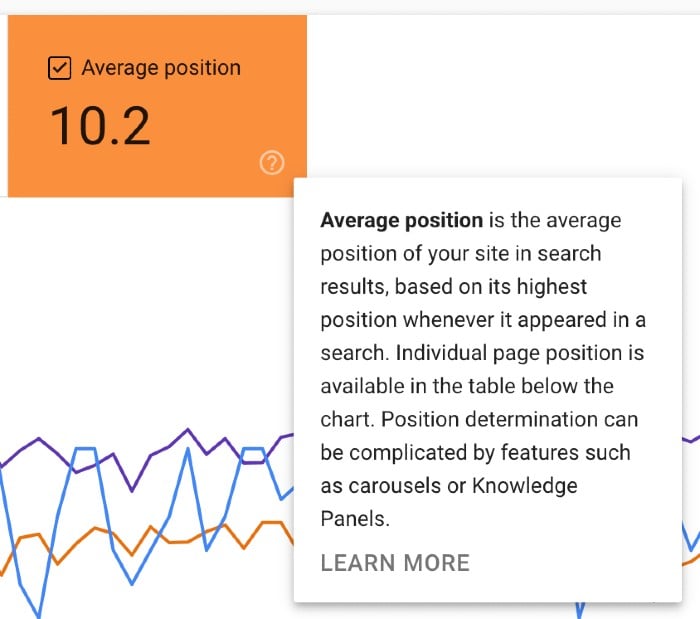
This is why it is important to track your keyword rankings, but they should not be the only metric you use to determine your SEO campaign’s success.
For your vacation rental business, the trajectory of your SEO campaign’s success starts from witnessing an increase in keyword rankings.
This is followed by impressions in GSC, when your rankings hit the first page you’ll see an increase in organic traffic, increase in conversions, and ultimately a boost in the number of bookings for your property rentals.
Usually, the progression goes like this:

But you need to ensure that you only track keywords that you are working on to improve their rankings. This can be assessed by:
- Writing new content for a specific keyword or phrase
- Optimizing your content and pages for that keyword
- Making technical improvements on pages that integrate your keyword
Organic Conversions (Primarily Bookings)
If you see an increase in organic conversions after performing SEO on specific pages on your site then that’s a pretty good indicator of effective SEO. Also, keep in mind the market changes like COVID-related trends as well as the seasonal changes that would cause an increase or decrease in bookings.
To track your bookings in Google Analytics, you need to set up ecommerce tracking for your website to monitor the conversions or transactions made through each channel.
It is easier to set up ecommerce tracking for some vacation website platforms by simply putting the Google Analytics ID in the site’s backend.
On the other hand, some vacation rental platforms require a professional to install Google Analytics code to be able to track these transactions.
PRO TIP
Many property management systems will show you which bookings came from what source (direct booking, Vrbo, AirBnB, etc).
But when a booking comes in from your website, most PMS platforms are not sophisticated enough to tell you what marketing channel drove the guest to your website.
That’s why Google Analytics is so valuable.
This data is important for determining your marketing budgets for email, SEO, social media, or paid advertising and investing more in the channel that generates the most bookings.
Go to the Acquisition section > All Traffic > Channels
Then select Ecommerce from the table.
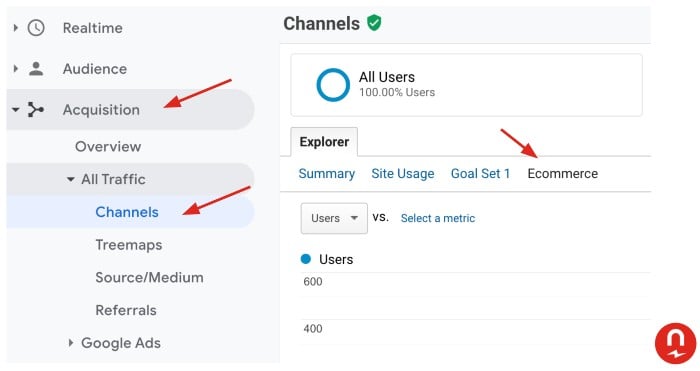
Now you can see which marketing channel is generating the most revenue from bookings.
Hint: It’s organic traffic…
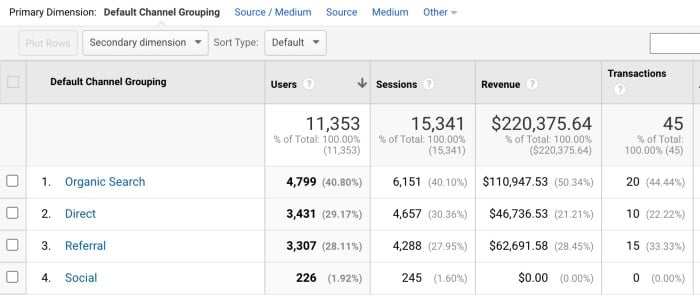
Assisted Conversions
Organic traffic can contribute to conversions and goals from other channels. These contributions are another way to measure progress from SEO.
Not every visit to your site will result in a conversion. However, it’s been proven many times over that guests will visit your site several times via different channels before finally booking that reservation.
In Google Analytics these are called Assisted Conversions.

This is Google’s measurement of interactions from any channel that eventually lead to a guest converting on your website. This doesn’t include the last-click before conversion.
This allows a VRM to understand the true value of a multi-channel approach to improving your direct bookings.
In analytics you can view this report by going to Conversions > Multi-Channel Funnels > Assisted Conversions:
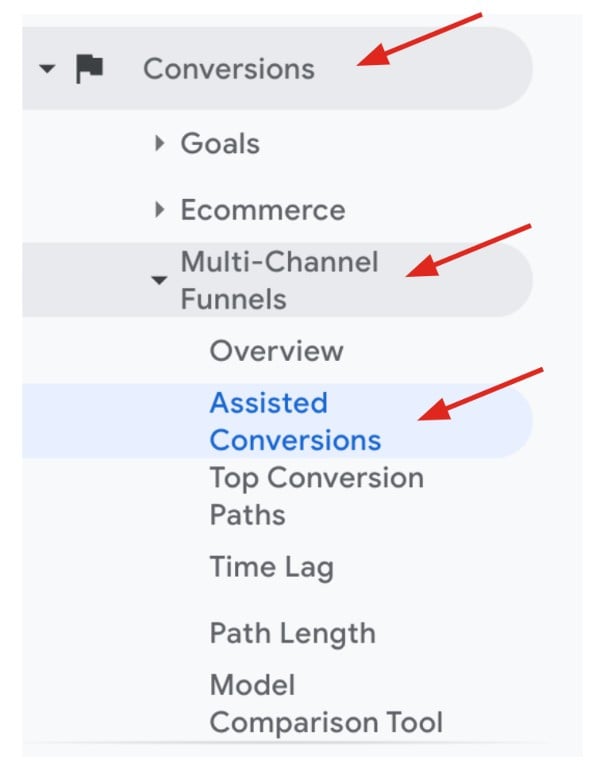
Organic Revenue
At the end of the campaign, a good vacation rental SEO company should be able to tell you if they’ve generated more organic revenue than the year before.
That’s the reason you hired them in the first place, right?

There’s a few things to consider with this metric though.
Variables that can muddy the waters with total organic revenue include the increased usage of dynamic pricing, the vacation rental market gaining popularity, the size of your property portfolio, and your overall property availability.
Each of these can skew the data a bit and make it harder to pin an actual revenue number and ROI on your SEO efforts but this is still a good metric to gauge the outcome from months of hard work.
Other Goals to Track
The more sophisticated your tracking gets the more tempting it is to track everything. Just remember that for everything you track, you want to be sure the data provides actionable insights.
Macro Conversions vs Micro Conversions
Macro Conversions refer to your website’s primary goals: booking a property, requesting a quote, or an upsell to a local tour. We discussed these above.
Micro Conversions represent everything else that doesn’t have a direct impact on the bottom line. Those goals could include things like navigation-based or engagement-based conversions. Or they could be as simple as newsletter signups.
Here’s some examples of micro conversions that you can track with Google Analytics.
Lead Generation Submissions From Homeowners
Set up lead generation forms for your vacation rental website to collect quality leads and track them through Google Analytics.
Unfortunately, this doesn’t enable you to track qualified and won leads.
For this you’d need to track the lead conversions in Google Analytics and the sales funnel success via your business’s CRM.
Website Property Reviews
You can set up a goal in analytics to record each time a review is left on one of your properties.
You can also ask your guests for online reviews that you can publish on your website as testimonials. The more of these you have, the easier it will be to encourage future bookings from new guests.
You can also use these testimonials in other marketing efforts.
Downloadable Travel Guides or Other Lead Generation
Do you offer a downloadable travel guide for your destination?
You can set up a goal in Google Analytics to track the number of visitors that signed up to download this guide.
How to Check Your Site for Google Analytics Issues
Utilizing the Tag Assistant for Conversions Chrome extension from Google can help you detect installation errors in the code of your website or even if the analytics code is missing entirely.
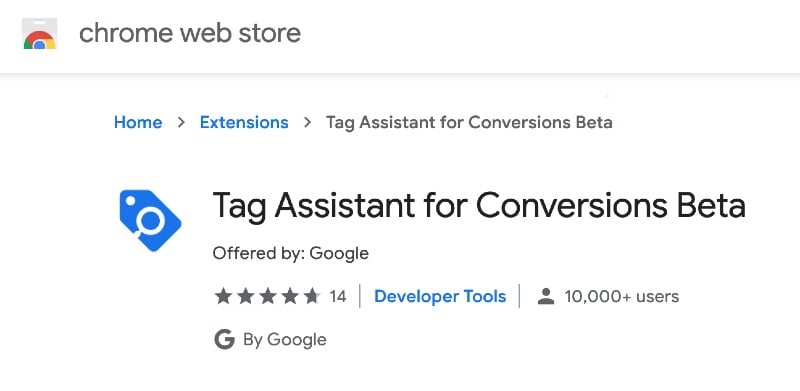
Grab it from the Chrome store and install it.
Go to your website and click the tag icon and it will present you with this screen.
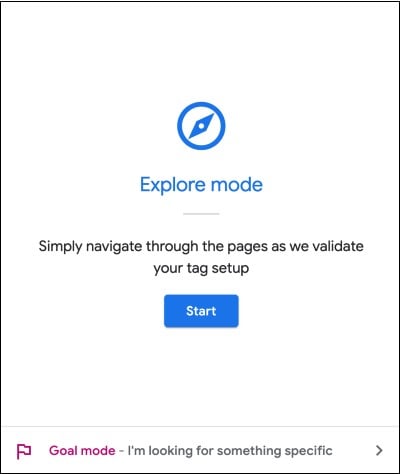
You can even detect things like goals and conversions from other tracking products.
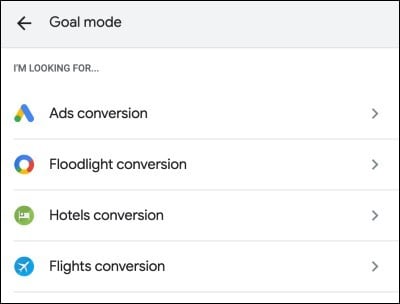
Click the start button, the page will refresh and you’ll get a little pop-up window in the bottom right corner of your browser. Here you can see the status of tags as you browse your site.

Once the extension finds an issue, you’ll need to click the extension icon again at the top of your browser and it’ll give you specifics about the error.
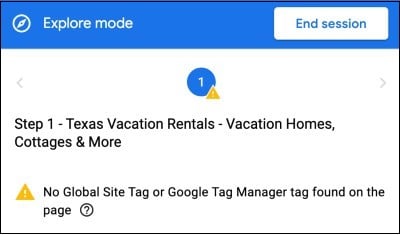
It didn’t take long to find an error on a test site. In their defense, they could be using some other form of analytics like New Relic. This tool works for Google products only.


